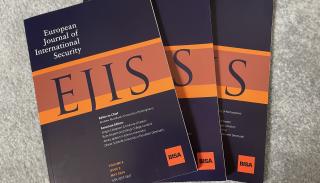
Breadcrumbs navigation
BISA at 50: Reflections and perspectives – 10 Years of the European Journal of International Security
As part of the BISA at 50 reflections and perspectives article series, Professor Tim Edmunds looks back at the creation of our journal European Journal of International Security (EJIS) in 2016. He reflects on the motivations and mission of the journal, the challenges in setting it up, and how far the journal has come over the past 10 years.
2025 marks the publication of the 10th volume of EJIS. As the founding editor of the EJIS, this is very special milestone for me, as I know it is for many others who have been involved with the journal over the years too. Even more so given that it coincides with the 50th anniversary year of BISA itself.
It is hugely gratifying to see how far the journal has come in this time, achieving a 2.5 impact factor in 2024, and ranked 25th out of 169 International Relations journals. It’s been fantastic to see how subsequent editorial teams, including the current one under Andrew Mumford, have worked to take the EJIS from strength to strength.
In our original Editorial and Mission Statement from volume 1, issue 1 in 2016, we outlined our ambitions and vision for the journal. We wanted to create a journal that would reflect and promote the diversity and innovation of security studies, and foster engagement between our various traditions and beyond. We were interested in both theory and empirical research, with an emphasis on academic rigour and a global scope. However, we did not seek to proscribe the boundaries of the discipline. Our view was that these are necessarily dynamic and can only emerge from dialogue between our different traditions, even when those traditions may oppose each other.
Quite deliberately, our original editorial team – comprising me as Editor-in-Chief, Elizabeth Keir as North America editor, Adrian Hyde-Price as European editor, and Christian Bueger, David Galbreath, Anthony King and Jutta Weldes as associate editors – reflected considerable diversity of approach.
Indeed, the initial motivation to put together a team to apply for the first editorship of the journal came from a meeting of an eclectic group of security studies scholars from the GW4 group of universities, comprising Bath, Bristol, Cardiff and Exeter in 2014. I think we surprised ourselves by how productive our conversations at the meeting were, despite our often very different intellectual traditions. We also saw an opportunity for a new initiative to bridge between scholars working on issues of security broadly defined, and counter tendencies towards atomisation and even polarisation in the discipline more widely.
The chance to do so came quickly, when BISA advertised for an inaugural editorial team to take on its proposed new security journal with Cambridge University Press (CUP), the EJIS. The terms of reference for the journal, originally put together by Theo Farrell, very much chimed with our own vision, and the rest as they say is history.
Ambitions and visions are all very well, but the task of putting together a new journal that could compete with the very best in the field turned out to be another order of task entirely. This was especially so given that the International Studies Association (ISA) announced its own ‘house’ security journal, the Journal of Global Security Studies, shortly after our team had been finalised.
The first lesson we learned was that starting a new journal from scratch is hard work! We started out with a cast iron commitment to publishing quality, field-advancing research. That meant persuading colleagues to submit their best papers to us, even though we were an unknown quantity at the time. We were helped by our association with BISA and CUP, and a superb editorial team - to whom we remain hugely grateful. We also spent a huge amount of time working with authors to make their papers as good as they could be. Even so, the first couple of years were, for me at least, characterised by relentless nervous tension over whether we’d have enough strong papers for the next issue and the quest to secure our first impact factor score.
The journal today is in a very different, less precarious, place, though continues to innovate and thrive. EJIS moved to a fully open access format in 2024, and its reach and reputation continue to grow. The past year has seen a near doubling of submissions, which support four strong issues a year at the cutting edge of the debates and issues animating global security. It is now well established as one of the leading security studies journals in the world, and a first port of call for some of the most interesting and exciting global scholarship in the field.
Had I known what lay ahead in 2015 when we were working frantically to put together our first issues for volume 1, it would have saved me many sleepless nights!
I am delighted to see how the EJIS has now joined its BISA sister journal, the Review of International Studies, in representing the very best of international studies scholarship to the wider discipline and beyond.
Here’s to the next 10 years and may they be as successful as the last!


